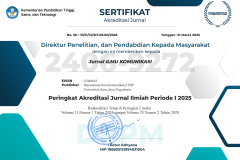Stereotip dan Kompetensi Komunikasi Bisnis Antarbudaya Bali dan Cina (Studi Di Kalangan Pengusaha Perak Bali Dan Cina)
DOI:
https://doi.org/10.24002/jik.v4i1.230Abstract
Abstract The result of this disertation made them capable Gudykunst and Kim’s intercultural theory, Spitzberg’s competence model of intercultural business communication, and ethnocentrism theory. There are agree with intercultural business communication reality in the community of Balinese and Chinese silver industrialists. The result of SEM statistical testing indicates that culture (for instance cultural values), socio-culture (for instance interethnic experience) and psycho-culture (for instance social prejudice) formed the interethnic stereotype that may influence the intercultural business communication competence. The results also approved that intercultural business communication competence is formed by motivation, knowledge and skill of communications in accordance with Spitzberg’s model. It indicates that ethnocentrism attitude toward other ethnic is not categorized as high but still exist.
Downloads
Published
How to Cite
Issue
Section
License
Jurnal ILMU KOMUNIKASI is an academic journal. As such, it is dedicated to the open exchange of information. For this reason, JIK is freely available to individuals and institutions. Authors who publish in Jurnal ILMU KOMUNIKASI will release their articles under the Creative Commons Attribution (BY) License. This license allows anyone to copy and redistribute the article in any medium or format as well as remix, transform, and build upon the material for any purpose, even commercially as long as they credit the authors for the original creation. For details of the rights authors grants users of their work, see the "human-readable summary" of the license, with a link to the full license. (Note that "you" refers to a user, not an author, in the summary)
 This work is licensed under a Creative Commons Attribution 4.0 International License.
This work is licensed under a Creative Commons Attribution 4.0 International License.














